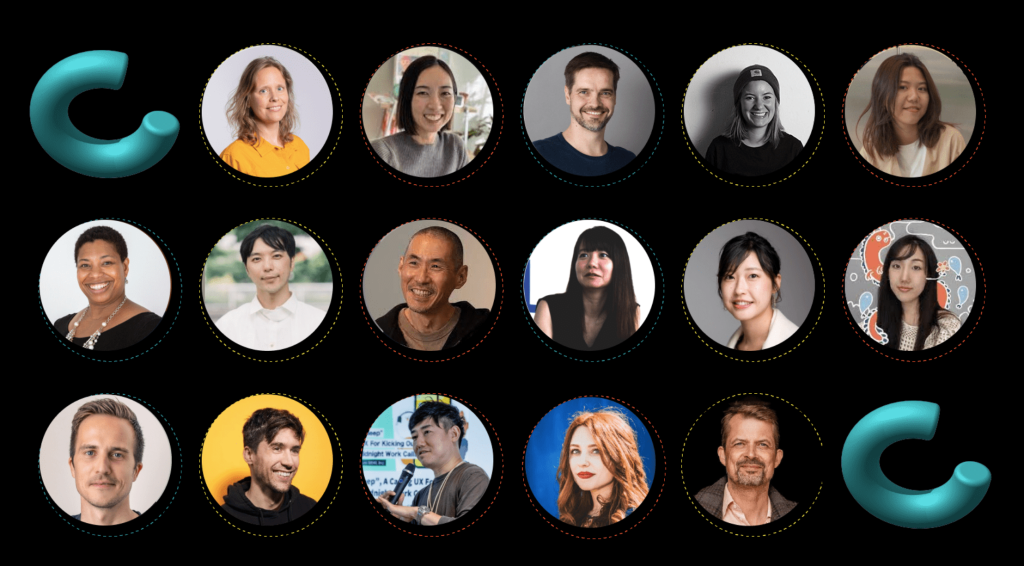Design Matters Tokyo will be back for its 4th edition on June 5-6, 2024, taking place in Tokyo and online. As usual, the event will bring on stage both Japanese and international designers to discuss everything digital design.
A committee of designers who spoke at Design Matters Tokyo 23 met for an online workshop in November to discuss the topics, trends and inspiration we want to bring to Design Matters Tokyo 24. The questions discussed include:
• What design trends are we going to see in 2024?
• What is hot in design right now?
• What are the most important topics to discuss in design now?
• Who should speak at Design Matters Tokyo 24?

Read the themes below. And don’t forget to get your ticket at designmatters.jp.
Craftsmanship strikes back

In today’s globalized tech world, Japan boasts a deep mastery of traditional crafts, and an ability to produce unique and innovative digital products and experiences. Blending heritage with modernity, Japan stands out in the international tech and entertainment landscape, showing that it’s possible to honor a rich cultural legacy whilst also uncovering invaluable insights for the future of design. This intersection has helped Japan transcend its geographical boundaries and inspire millions of people around the world.
This theme will tackle the fusion of design, innovation, and entertainment, weaving together traditional craftsmanship with cutting-edge technology, all while embracing the joy and curiosity that are part of the creative process – both in Japan and around the world.
Exploring ways to create excellent enterprise products isn’t the only topic addressed in this theme: gamification, designing for delight, pushing the boundaries of curiosity, learning how we designers can make time to nurture creativity in order to craft better products are other topics this theme will dive into. But also; how do we design for entertainment? What can designers learn from the Japanese entertainment industry? How do we make core enterprise products more fun and engaging? Where is the sweet spot where craft meets tech? Can improvisation be a catalyst for creativity?
Mastering craftsmanship and nailing the intersection between tradition and innovation will be key for the future of design. Join the conference and discover how to find this intersectionality and embed it in your design.
Design, what’s next?

In an ever-evolving industry such as the design industry, exploring the next frontier is a must. Being aware (or even participating in the creation) of upcoming trends, technologies, tools, and methodologies is fundamental to stay relevant. Exploring and trying to understand what’s coming anticipates the needs of a dynamic market but also fuels creative adaptability. And to do so, designers need to ensure that they are equipped with the latest tools and strategies, and that their workspace fosters a landscape where groundbreaking ideas can thrive.
This theme will look into a series of emerging topics and technologies such as extended reality, responsive reality, large language models, spatial design and interactions, realtime 3D, avatar and soundscape design, prompt design and new design processes that use AI. But also topics like prototyping, data visualization, the relation between biomimicry and design, the pros and cons of using algorithms vs organic design, how to design for an established remote workflow, how to move from being a UX/UI designer to becoming a full stack designer.
In an era where staying ahead is synonymous with shaping the landscapes of tomorrow, it’s key to explore the new tools and tech of today that will propel the industry forward. Join Design Matters Tokyo 24 and dive into the future of design.
How to design a society

We know designers hold an incredible power in shaping the life and experiences of people impacting the way they navigate and interact with the world around them. Therefore, we can’t ignore the social weight that designing holds. Designing for society ultimately means designing society itself. In fact, designers have the unique ability to align with collective needs and values to create solutions. Understanding the relationship between design and institutions is crucial, as it shapes societal behavior and vice versa. In the digital age, this connection is amplified, demanding designers to navigate ethical considerations and societal impacts of technology. Businesses too hold a similar type of power and influence over local as well as global ecosystems.
This theme will explore how to design for impact, including how to invite non-designers into the design process. On a mission to help people connect more and better, this theme will look at society from a variety of perspectives; for example, how to design for people of different ages in a country like Japan where the population is aging and digitalization is spreading. Service design, city planning, and even life planning with the help of design are topics that will be tackled in this theme. We will explore a series of questions such as; How can we design for both business and society? How does policy impact design in different countries? How do we become more aware of the biases of designers and AI models? Are there other metrics, like happiness, we can use to design, and how do we measure it? How do design and propaganda intertwine?
By fostering a relationship between design and the collective, designers can contribute to the creation of a more harmonious, inclusive, and responsible societal evolution. Join this call to wield design as a tool for positive transformation, recognizing its profound influence from and on institutions and the pivotal role it plays in the ongoing digital revolution.
Diversity, Equity, and Inclusion as an overarching theme
Design Matters places Diversity, Equity, and Inclusion (DEI) at its core, fostering an environment where design professionals can feel welcome and share their experiences. The DEI agenda is an overarching theme in all of Design Matters conferences, including Design Matters Tokyo 24. It’s crucial to make design more ethical, emphasizing the responsibility of designers in ensuring accessibility, inclusion, and representation for all. At this conference, for instance, we will address the diverse needs of aging individuals as well as children, when it comes to digitization. The conference will also delve into biases within AI and that designers have themselves, probing the impact on design outcomes. Localization and the celebration of indigenous and local design, and how to amplify the cultural richness embedded in global design landscapes. Design Systems will be explored through the lens of inclusion, promoting accessibility. Finally, the topic of Design Justice will be explored, looking at how to advocate for equitable design practices. Design Matters is committed to shaping a future where design not only meets user needs but also champions social responsibility and inclusivity.










